Unit 2 What time do you go to school? Section B 1a-2c 同步习题课件(31张PPT,无音频)
文档属性
| 名称 | Unit 2 What time do you go to school? Section B 1a-2c 同步习题课件(31张PPT,无音频) | 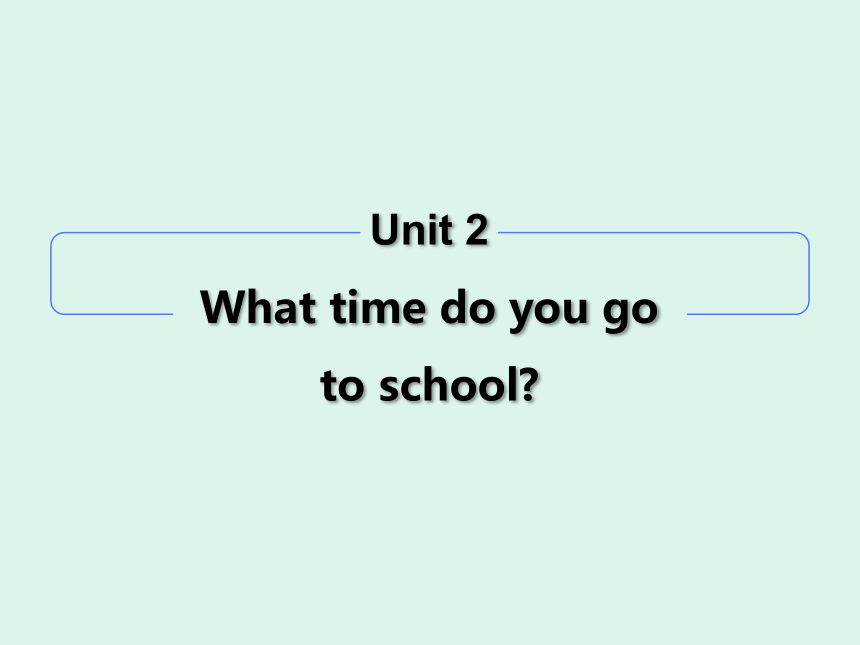 | |
| 格式 | ppt | ||
| 文件大小 | 169.0KB | ||
| 资源类型 | 教案 | ||
| 版本资源 | 人教新目标(Go for it)版 | ||
| 科目 | 英语 | ||
| 更新时间 | 2021-03-14 21:33:39 | ||
图片预览

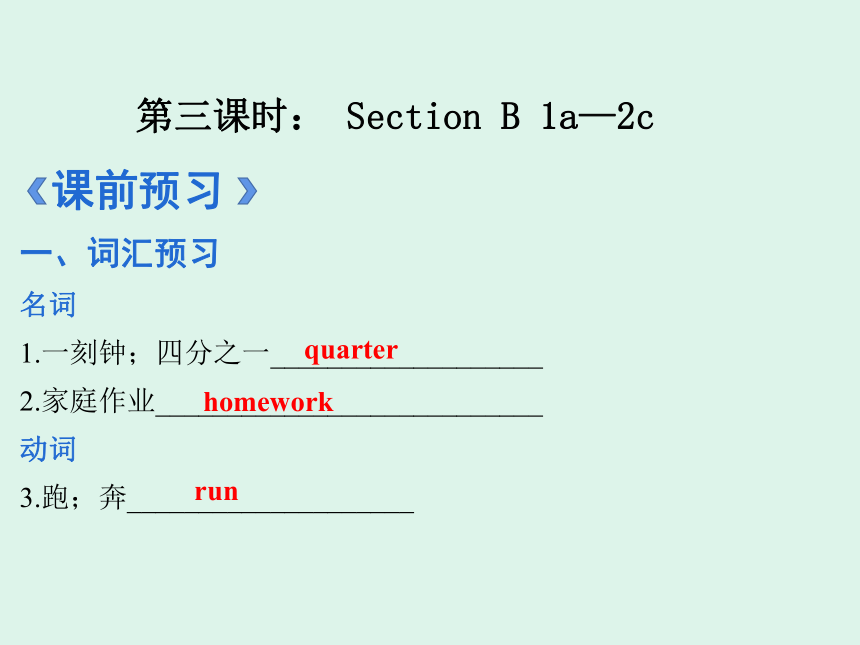
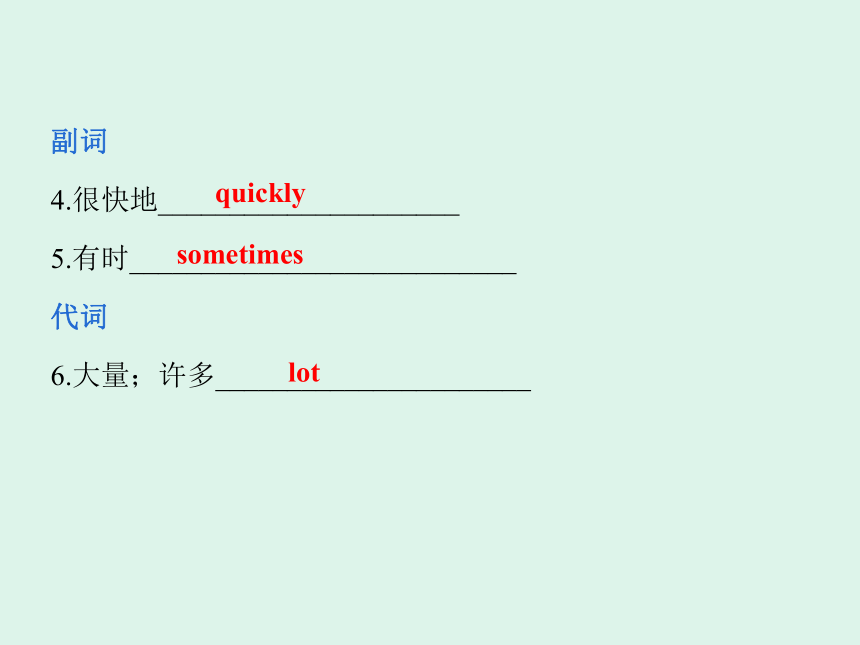
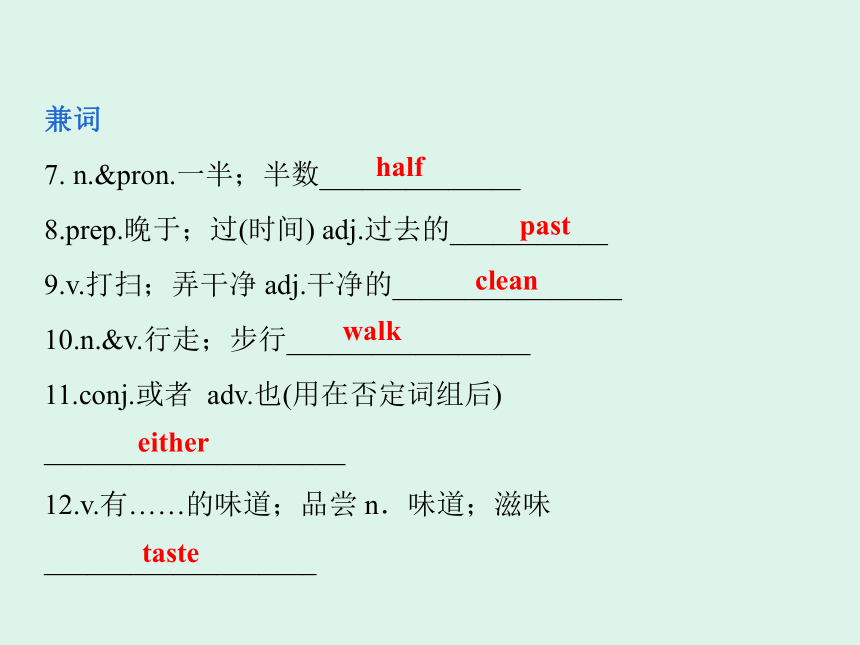
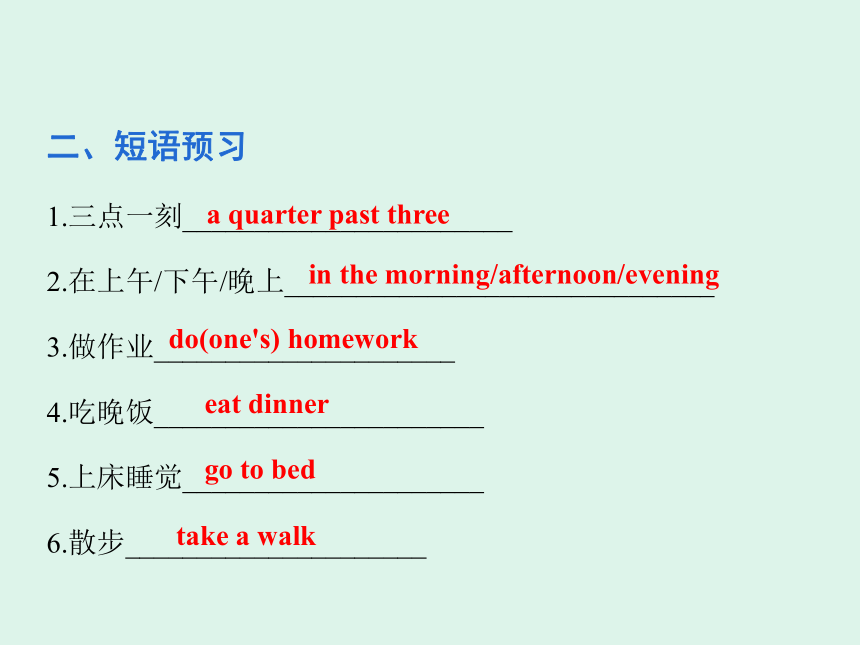
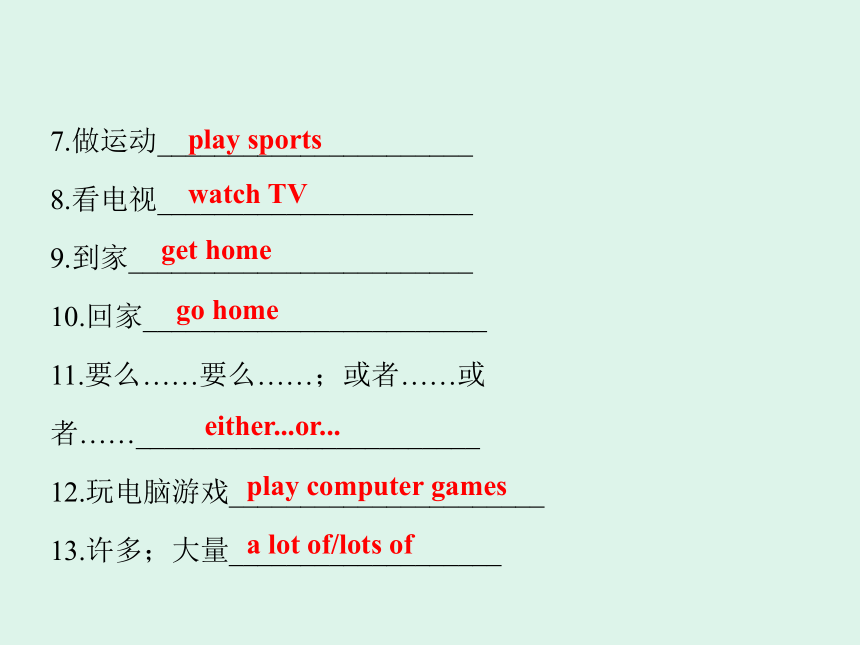
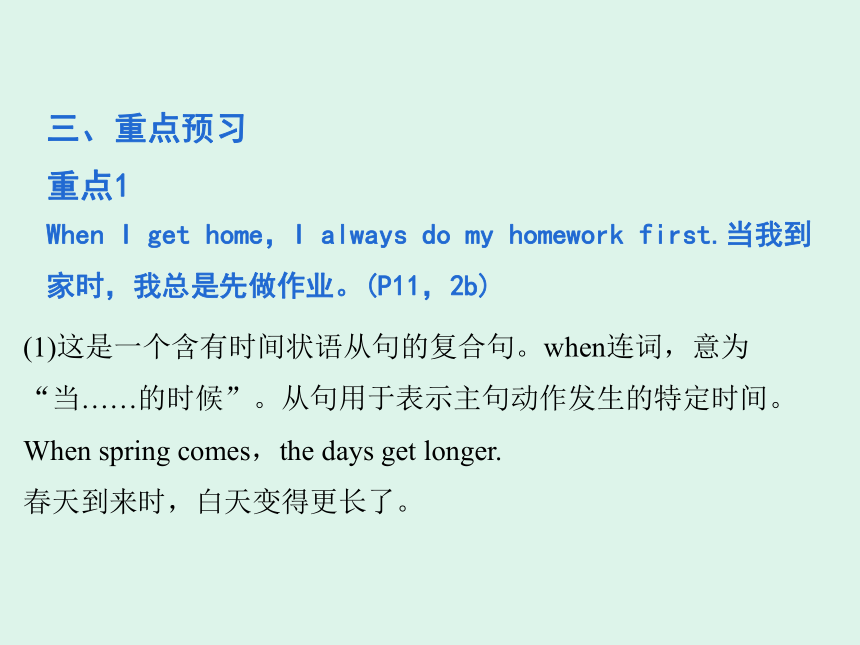
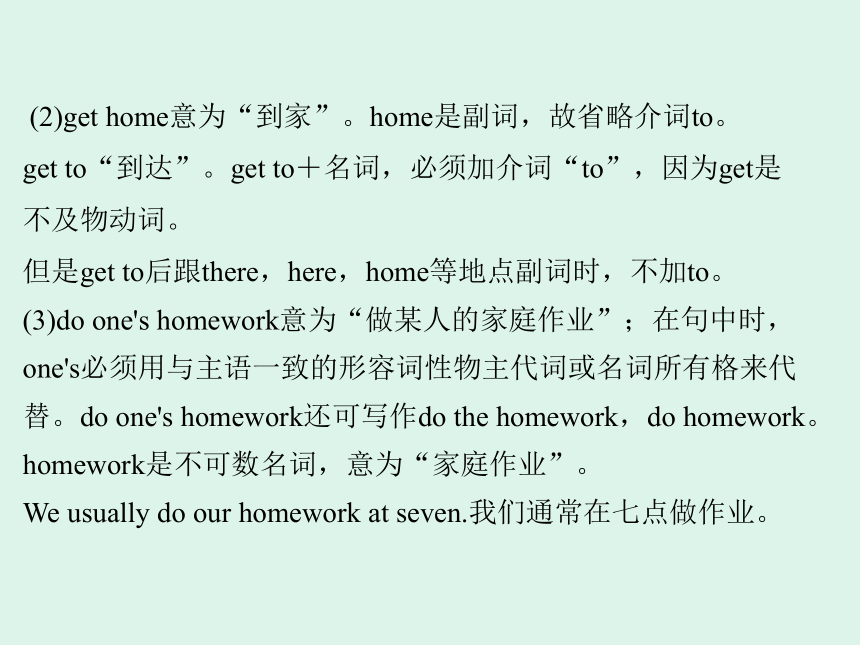
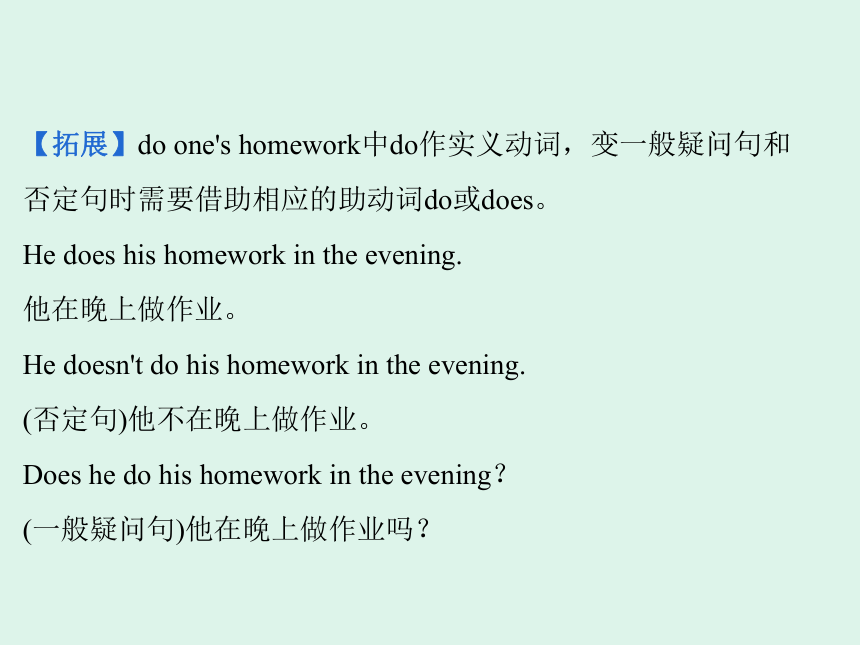
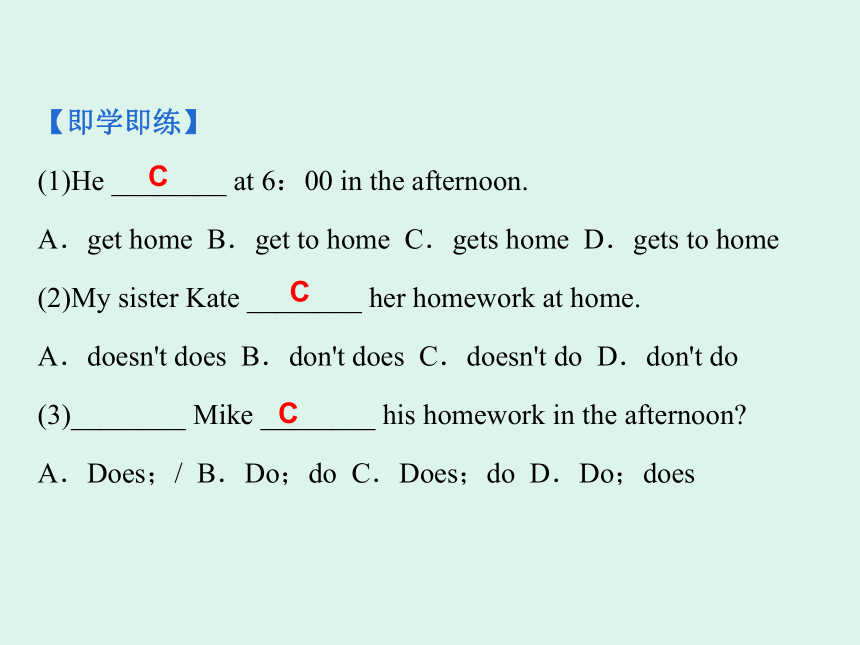
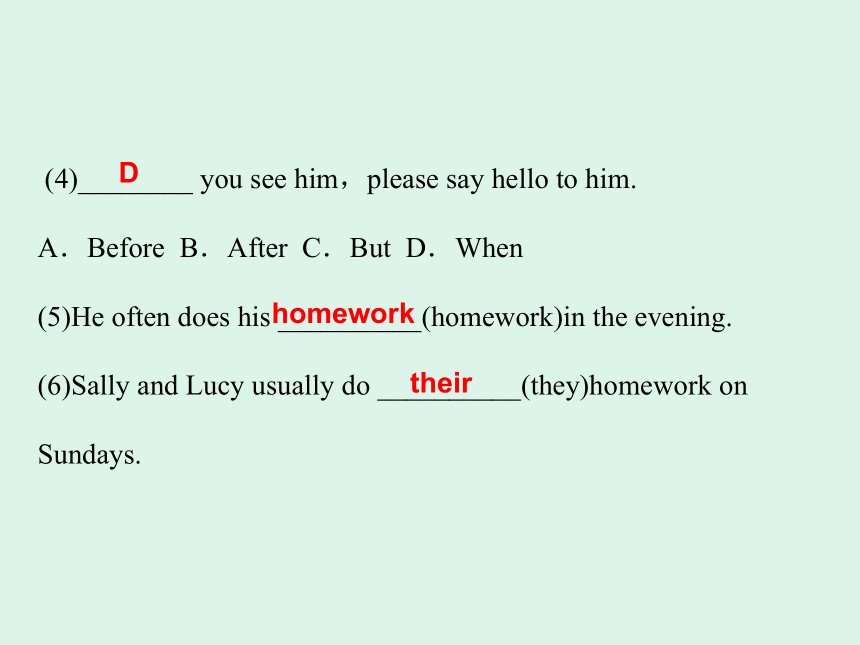
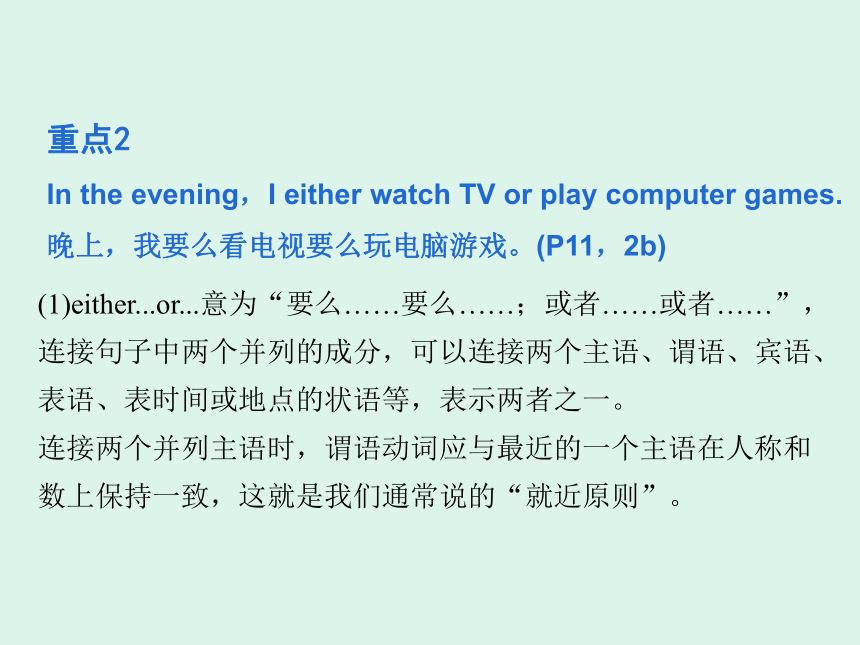
文档简介
Unit 2
What time do you go
to school?
课前预习
一、词汇预习
名词
1.一刻钟;四分之一___________________
2.家庭作业___________________________
动词
3.跑;奔____________________
quarter
homework
第三课时: Section B 1a—2c
run
副词
4.很快地_____________________
5.有时___________________________
代词
6.大量;许多______________________
quickly
sometimes
lot
兼词
7. n.&pron.一半;半数______________
8.prep.晚于;过(时间) adj.过去的___________
9.v.打扫;弄干净 adj.干净的________________
10.n.&v.行走;步行_________________
11.conj.或者 adv.也(用在否定词组后) _____________________
12.v.有……的味道;品尝 n.味道;滋味___________________
half
past
clean
walk
either
taste
1.三点一刻_______________________
2.在上午/下午/晚上______________________________
3.做作业_____________________
4.吃晚饭_______________________
5.上床睡觉_____________________
6.散步_____________________
二、短语预习
a quarter past three
in the morning/afternoon/evening
do(one's) homework
eat dinner
go to bed
take a walk
7.做运动______________________
8.看电视______________________
9.到家________________________
10.回家________________________
11.要么……要么……;或者……或者……________________________
12.玩电脑游戏______________________
13.许多;大量___________________
play sports
watch TV
get home
go home
either...or...
play computer games
a lot of/lots of
(1)这是一个含有时间状语从句的复合句。when连词,意为“当……的时候”。从句用于表示主句动作发生的特定时间。
When spring comes,the days get longer.
春天到来时,白天变得更长了。
三、重点预习
When I get home,I always do my homework first.当我到家时,我总是先做作业。(P11,2b)
重点1
(2)get home意为“到家”。home是副词,故省略介词to。
get to“到达”。get to+名词,必须加介词“to”,因为get是不及物动词。
但是get to后跟there,here,home等地点副词时,不加to。
(3)do one's homework意为“做某人的家庭作业”;在句中时,one's必须用与主语一致的形容词性物主代词或名词所有格来代替。do one's homework还可写作do the homework,do homework。homework是不可数名词,意为“家庭作业”。
We usually do our homework at seven.我们通常在七点做作业。
【拓展】do one's homework中do作实义动词,变一般疑问句和否定句时需要借助相应的助动词do或does。
He does his homework in the evening.
他在晚上做作业。
He doesn't do his homework in the evening.
(否定句)他不在晚上做作业。
Does he do his homework in the evening?
(一般疑问句)他在晚上做作业吗?
【即学即练】
(1)He ________ at 6:00 in the afternoon.
A.get home B.get to home C.gets home D.gets to home
(2)My sister Kate ________ her homework at home.
A.doesn't does B.don't does C.doesn't do D.don't do
(3)________ Mike ________ his homework in the afternoon?
A.Does;/ B.Do;do C.Does;do D.Do;does
C
C
C
(4)________ you see him,please say hello to him.
A.Before B.After C.But D.When
(5)He often does his __________(homework)in the evening.
(6)Sally and Lucy usually do __________(they)homework on Sundays.
D
homework
their
(1)either...or...意为“要么……要么……;或者……或者……”,连接句子中两个并列的成分,可以连接两个主语、谓语、宾语、表语、表时间或地点的状语等,表示两者之一。
连接两个并列主语时,谓语动词应与最近的一个主语在人称和数上保持一致,这就是我们通常说的“就近原则”。
In the evening,I either watch TV or play computer games.晚上,我要么看电视要么玩电脑游戏。(P11,2b)
重点2
Either you or my sister is wrong.要么你错了,要么我妹妹错了。
Either you or I am going home.要么你回家,要么我回家。
(2)either用作代词时,意为“两者之一”,可单独使用,也可和表示范围的of短语连用,of后的名词一般为复数,并且是特指。
Either(of them)is OK.(他们两个中)任何一个都行。
(3)either作副词,意为“也”,通常用于否定句句末。
He doesn't like swimming;his brother doesn't,either.他不喜欢游泳,他弟弟也不喜欢。
【即学即练】
(1)I may live ________ in a hotel ________ in a friend's house.
A.both;and B.either;or
C.neither;nor D.not only;but also
(2)Today there are two new students in our class.I don't know ________ of them.
A.either B.nor C.neither D.both
(3)Either you or he ________ lunch at school.
A.is B.are C.has D.have
B
C
A
(4)I don't like milk.I don't like coffee,________.
A.too B.either C.also D.or
(5)你或她都擅长绘画。
__________ you __________ she is good at drawing.
(6)He has an English-Chinese dictionary,too.(变为否定句)
_____________________________________________________________________
B
or
Either
He doesn't have an English-Chinese dictionary,either.
lot是代词,意为“大量;许多”,常用于固定搭配a lot of 或lots of,意为“许多的,大量的”,只能用于肯定句中;a lot of和lots of既可修饰可数名词复数,也可修饰不可数名词。
There are a lot of/lots of trees on the hill.山上有许多树。
We have a lot of/lots of vegetables every day.
我们每天都吃许多蔬菜
At twelve,she eats lots of fruit and vegetables for lunch.十二点的时候,她午餐吃了很多水果和蔬菜。(P11,2b)
重点3
【拓展】many和much 也可以表示“大量;许多”。
There is a lot of(=much/lots of)water.这里有很多水。
There are lots of(=a lot of/many)books.这里有很多书。
【即学即练】
(1)Tom often exercises and eats ________ healthy food.So he is in good health.
A.a lot B.lot of C.lots of D.a lots of
(2)There are ________ books in the school library,but I don't have ________ time to read.
A.much;many B.many;much
C.a lots of;a lot D.many;a lot
C
B
(3)我妹妹总是吃很多蔬菜。
My sister always eats __________ __________.
=My sister always eats __________ ________ __________.
=My sister always eats ______ ______ ______ ___________.
many vegetables
lots of vegetables
a lot of vegetables
(1)be good for...意为“对……有好处”。其反义词组为 be bad for...,意为“对……有害”。
Eating more vegetables is good for your health.多吃蔬菜对你的健康有好处。
She knows it's not good for her,but it tastes good!她知道这对她不好,但味道很好!(P11,2b)
重点4
(2)taste的用法:
① 作系动词,意为“有……味道;品尝”。taste+adj.意为“尝起来怎么样”,taste like+n.意为“尝起来像……”。
The cake tastes nice.蛋糕尝起来不错。
②作名词,意为“味道;滋味”。
Sugar has a sweet taste.糖有甜味。
【拓展】类似的感官动词还有:feel“感觉起来”;sound“听起来”;smell“闻起来”;look“看上去”等。
【即学即练】
(1)The vegetable soup ________ delicious.Can I have more?
A.looks B.tastes C.sounds D.feels
(2)The idea sounds __________(好).
(3)多做运动对你的健康有好处。
Doing more exercise __________ __________ __________ your health.
B
good
is good for
一、阅读理解
(一)阅读课本中P11,2b的短文内容,选择正确的答案。(每小题2分,共8分)
( )1.How long does Tony play basketball after school?
A.One and a half hour. B.45 minutes.
C.An hour. D.30 minutes.
( )2.What does Mary sometimes do after lunch?
A.Do homework. B.Play volleyball.
C.Swim. D.Take a walk.
D
B
当堂巩固
( )3.What time does Mary go to bed?
A.At 8:30. B.At 9:30. C.At 10:00. D.At 10:30.
( )4.According to the passage,which one of the following is
True?
A.Mary likes taking a shower after breakfast.
B.Mary always eats ice-cream after lunch.
C.Tony usually gets up late.
D.Tony either watches TV or does his homework in the
evening.
B
C
(二)阅读课本中P11,2b的短文内容,回答问题。(每小题2分,共8分)
1.What does Tony usually eat for lunch?
___________________________________________________
2.What does Tony do first when he gets home?
___________________________________________________
3.What time does Mary usually get up?
___________________________________________________
4.Do Tony and Mary go to school at the same time?
___________________________________________________
Hamburgers.
He does his homework first.
At six thirty/6:30.
Yes,they do.
二、根据中文意思提示,用单词的适当形式填空,每空一词。(每小题1分,共5分)
1.I need a __________(一刻钟) to go to school.
2.It's too late.Let's go home __________(很快地).
3.I __________(有时) play ping-pong with my friends.
4.These apples __________(尝起来) good.
5.Paul likes sports.He __________(跑步) every morning.
quarter
quickly
sometimes
taste
runs
三、根据中文提示完成句子,每空一词。(每小题2分,共10分)
1.她现在不是在教室里就是在社团里。
She is __________ in the classroom __________ in the club.
2.你通常什么时间跑步?
__________ __________ do you usually__________?
3.不要在暗处看书。这对你的眼睛不好。
Don't read in the dark.It's ________ _________ _________ your eyes.
either
or
What time
run
not good for
4.我的爷爷总是晚饭后去散步。
My grandfather always __________ __________ __________ after dinner.
5.她通常在下午5:30回到家。
She usually __________ __________ at
__________ __________ __________ in the afternoon.
takes a walk
gets home
half past five
四、单项选择。(每小题1分,共5分)
( )1.She either plays soccer ________ takes a walk in the
afternoon.
A.and B.or C.but D.so
( )2.Bill goes to bed at ________ to ten in the evening.
A.quarter B.quarters
C.a quarter D.three quarters
B
C
( )3.The hamburger ________ good.Do you want one?
A.sound B.sounds C.taste D.tastes
( )4.We usually eat ________vegetables ________ dinner.
A.lots of;for B.lots of;have
C.a lot;for D.a lot;have
( )5.She ________ her ________ every evening at home.
A.does;homework B.does;homeworks
C.do;homework D.do;homeworks
D
A
A
Thank you!
What time do you go
to school?
课前预习
一、词汇预习
名词
1.一刻钟;四分之一___________________
2.家庭作业___________________________
动词
3.跑;奔____________________
quarter
homework
第三课时: Section B 1a—2c
run
副词
4.很快地_____________________
5.有时___________________________
代词
6.大量;许多______________________
quickly
sometimes
lot
兼词
7. n.&pron.一半;半数______________
8.prep.晚于;过(时间) adj.过去的___________
9.v.打扫;弄干净 adj.干净的________________
10.n.&v.行走;步行_________________
11.conj.或者 adv.也(用在否定词组后) _____________________
12.v.有……的味道;品尝 n.味道;滋味___________________
half
past
clean
walk
either
taste
1.三点一刻_______________________
2.在上午/下午/晚上______________________________
3.做作业_____________________
4.吃晚饭_______________________
5.上床睡觉_____________________
6.散步_____________________
二、短语预习
a quarter past three
in the morning/afternoon/evening
do(one's) homework
eat dinner
go to bed
take a walk
7.做运动______________________
8.看电视______________________
9.到家________________________
10.回家________________________
11.要么……要么……;或者……或者……________________________
12.玩电脑游戏______________________
13.许多;大量___________________
play sports
watch TV
get home
go home
either...or...
play computer games
a lot of/lots of
(1)这是一个含有时间状语从句的复合句。when连词,意为“当……的时候”。从句用于表示主句动作发生的特定时间。
When spring comes,the days get longer.
春天到来时,白天变得更长了。
三、重点预习
When I get home,I always do my homework first.当我到家时,我总是先做作业。(P11,2b)
重点1
(2)get home意为“到家”。home是副词,故省略介词to。
get to“到达”。get to+名词,必须加介词“to”,因为get是不及物动词。
但是get to后跟there,here,home等地点副词时,不加to。
(3)do one's homework意为“做某人的家庭作业”;在句中时,one's必须用与主语一致的形容词性物主代词或名词所有格来代替。do one's homework还可写作do the homework,do homework。homework是不可数名词,意为“家庭作业”。
We usually do our homework at seven.我们通常在七点做作业。
【拓展】do one's homework中do作实义动词,变一般疑问句和否定句时需要借助相应的助动词do或does。
He does his homework in the evening.
他在晚上做作业。
He doesn't do his homework in the evening.
(否定句)他不在晚上做作业。
Does he do his homework in the evening?
(一般疑问句)他在晚上做作业吗?
【即学即练】
(1)He ________ at 6:00 in the afternoon.
A.get home B.get to home C.gets home D.gets to home
(2)My sister Kate ________ her homework at home.
A.doesn't does B.don't does C.doesn't do D.don't do
(3)________ Mike ________ his homework in the afternoon?
A.Does;/ B.Do;do C.Does;do D.Do;does
C
C
C
(4)________ you see him,please say hello to him.
A.Before B.After C.But D.When
(5)He often does his __________(homework)in the evening.
(6)Sally and Lucy usually do __________(they)homework on Sundays.
D
homework
their
(1)either...or...意为“要么……要么……;或者……或者……”,连接句子中两个并列的成分,可以连接两个主语、谓语、宾语、表语、表时间或地点的状语等,表示两者之一。
连接两个并列主语时,谓语动词应与最近的一个主语在人称和数上保持一致,这就是我们通常说的“就近原则”。
In the evening,I either watch TV or play computer games.晚上,我要么看电视要么玩电脑游戏。(P11,2b)
重点2
Either you or my sister is wrong.要么你错了,要么我妹妹错了。
Either you or I am going home.要么你回家,要么我回家。
(2)either用作代词时,意为“两者之一”,可单独使用,也可和表示范围的of短语连用,of后的名词一般为复数,并且是特指。
Either(of them)is OK.(他们两个中)任何一个都行。
(3)either作副词,意为“也”,通常用于否定句句末。
He doesn't like swimming;his brother doesn't,either.他不喜欢游泳,他弟弟也不喜欢。
【即学即练】
(1)I may live ________ in a hotel ________ in a friend's house.
A.both;and B.either;or
C.neither;nor D.not only;but also
(2)Today there are two new students in our class.I don't know ________ of them.
A.either B.nor C.neither D.both
(3)Either you or he ________ lunch at school.
A.is B.are C.has D.have
B
C
A
(4)I don't like milk.I don't like coffee,________.
A.too B.either C.also D.or
(5)你或她都擅长绘画。
__________ you __________ she is good at drawing.
(6)He has an English-Chinese dictionary,too.(变为否定句)
_____________________________________________________________________
B
or
Either
He doesn't have an English-Chinese dictionary,either.
lot是代词,意为“大量;许多”,常用于固定搭配a lot of 或lots of,意为“许多的,大量的”,只能用于肯定句中;a lot of和lots of既可修饰可数名词复数,也可修饰不可数名词。
There are a lot of/lots of trees on the hill.山上有许多树。
We have a lot of/lots of vegetables every day.
我们每天都吃许多蔬菜
At twelve,she eats lots of fruit and vegetables for lunch.十二点的时候,她午餐吃了很多水果和蔬菜。(P11,2b)
重点3
【拓展】many和much 也可以表示“大量;许多”。
There is a lot of(=much/lots of)water.这里有很多水。
There are lots of(=a lot of/many)books.这里有很多书。
【即学即练】
(1)Tom often exercises and eats ________ healthy food.So he is in good health.
A.a lot B.lot of C.lots of D.a lots of
(2)There are ________ books in the school library,but I don't have ________ time to read.
A.much;many B.many;much
C.a lots of;a lot D.many;a lot
C
B
(3)我妹妹总是吃很多蔬菜。
My sister always eats __________ __________.
=My sister always eats __________ ________ __________.
=My sister always eats ______ ______ ______ ___________.
many vegetables
lots of vegetables
a lot of vegetables
(1)be good for...意为“对……有好处”。其反义词组为 be bad for...,意为“对……有害”。
Eating more vegetables is good for your health.多吃蔬菜对你的健康有好处。
She knows it's not good for her,but it tastes good!她知道这对她不好,但味道很好!(P11,2b)
重点4
(2)taste的用法:
① 作系动词,意为“有……味道;品尝”。taste+adj.意为“尝起来怎么样”,taste like+n.意为“尝起来像……”。
The cake tastes nice.蛋糕尝起来不错。
②作名词,意为“味道;滋味”。
Sugar has a sweet taste.糖有甜味。
【拓展】类似的感官动词还有:feel“感觉起来”;sound“听起来”;smell“闻起来”;look“看上去”等。
【即学即练】
(1)The vegetable soup ________ delicious.Can I have more?
A.looks B.tastes C.sounds D.feels
(2)The idea sounds __________(好).
(3)多做运动对你的健康有好处。
Doing more exercise __________ __________ __________ your health.
B
good
is good for
一、阅读理解
(一)阅读课本中P11,2b的短文内容,选择正确的答案。(每小题2分,共8分)
( )1.How long does Tony play basketball after school?
A.One and a half hour. B.45 minutes.
C.An hour. D.30 minutes.
( )2.What does Mary sometimes do after lunch?
A.Do homework. B.Play volleyball.
C.Swim. D.Take a walk.
D
B
当堂巩固
( )3.What time does Mary go to bed?
A.At 8:30. B.At 9:30. C.At 10:00. D.At 10:30.
( )4.According to the passage,which one of the following is
True?
A.Mary likes taking a shower after breakfast.
B.Mary always eats ice-cream after lunch.
C.Tony usually gets up late.
D.Tony either watches TV or does his homework in the
evening.
B
C
(二)阅读课本中P11,2b的短文内容,回答问题。(每小题2分,共8分)
1.What does Tony usually eat for lunch?
___________________________________________________
2.What does Tony do first when he gets home?
___________________________________________________
3.What time does Mary usually get up?
___________________________________________________
4.Do Tony and Mary go to school at the same time?
___________________________________________________
Hamburgers.
He does his homework first.
At six thirty/6:30.
Yes,they do.
二、根据中文意思提示,用单词的适当形式填空,每空一词。(每小题1分,共5分)
1.I need a __________(一刻钟) to go to school.
2.It's too late.Let's go home __________(很快地).
3.I __________(有时) play ping-pong with my friends.
4.These apples __________(尝起来) good.
5.Paul likes sports.He __________(跑步) every morning.
quarter
quickly
sometimes
taste
runs
三、根据中文提示完成句子,每空一词。(每小题2分,共10分)
1.她现在不是在教室里就是在社团里。
She is __________ in the classroom __________ in the club.
2.你通常什么时间跑步?
__________ __________ do you usually__________?
3.不要在暗处看书。这对你的眼睛不好。
Don't read in the dark.It's ________ _________ _________ your eyes.
either
or
What time
run
not good for
4.我的爷爷总是晚饭后去散步。
My grandfather always __________ __________ __________ after dinner.
5.她通常在下午5:30回到家。
She usually __________ __________ at
__________ __________ __________ in the afternoon.
takes a walk
gets home
half past five
四、单项选择。(每小题1分,共5分)
( )1.She either plays soccer ________ takes a walk in the
afternoon.
A.and B.or C.but D.so
( )2.Bill goes to bed at ________ to ten in the evening.
A.quarter B.quarters
C.a quarter D.three quarters
B
C
( )3.The hamburger ________ good.Do you want one?
A.sound B.sounds C.taste D.tastes
( )4.We usually eat ________vegetables ________ dinner.
A.lots of;for B.lots of;have
C.a lot;for D.a lot;have
( )5.She ________ her ________ every evening at home.
A.does;homework B.does;homeworks
C.do;homework D.do;homeworks
D
A
A
Thank you!
同课章节目录
- Unit 1 Can you play the guitar?
- Section A
- Section B
- Unit 2 What time do you go to school?
- Section A
- Section B
- Unit 3 How do you get to school?
- Section A
- Section B
- Unit 4 Don't eat in class.
- Section A
- Section B
- Unit 5 Why do you like pandas?
- Section A
- Section B
- Unit 6 I'm watching TV.
- Section A
- Section B
- Review of Units 1-6
- Unit 7 It's raining!
- Section A
- Section B
- Unit 8 Is there a post office near here?
- Section A
- Section B
- Unit 9 What does he look like?
- Section A
- Section B
- Unit 10 I'd like some noodles.
- Section A
- Section B
- Unit 11 How was your school trip?
- Section A
- Section B
- Unit 12 What did you do last weekend?
- Section A
- Section B
